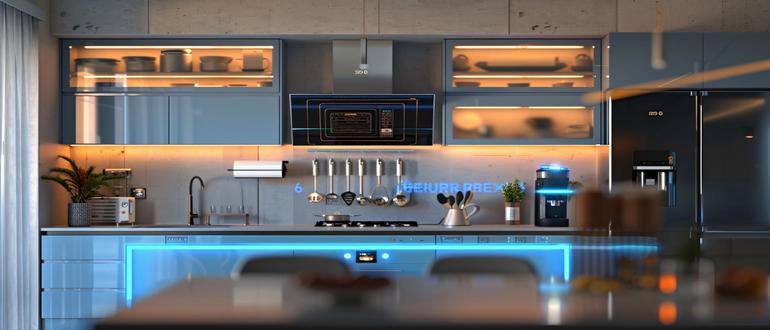
For centuries, cooking has been an art passed down through generations, requiring skill, patience and intuition. But with the rise of smart appliances, we are witnessing a shift where technology is assisting – and in some cases—taking over aspects of meal preparation.
Artificial intelligence- (AI) powered smart appliances like Rotimatic, smart ovens, coffee makers and internet-of-things- (IoT) connected refrigerators are reshaping our cooking experience, enhancing convenience, ensuring precision and helping minimize food waste. Together AI and IoT are transforming the way we cook and eat.
How AI is Transforming Smart Kitchens
From the first electric stoves to today’s Wi-Fi-connected ovens, kitchen technology has evolved rapidly. In the latest leap, the integration of AI and IoT is bringing intelligence and automation to everyday cooking. The innovations aren’t just about convenience—but about enhancing precision, minimizing food waste and even promoting healthier eating habits.
1. Real-time Monitoring & Adaptability
AI-driven appliances adjust cooking parameters on the fly—whether it’s temperature, cooking time or ingredient consistency. This means fewer burnt or overdone dishes and perfectly cooked meals, every single time.
2. Personalized Cooking Experience
Ever wished your kitchen could remember your preferences? AI-powered devices learn from your habits and tailor cooking settings to match your taste. Whether you like your rotis softer or slightly crisp, AI ensures every meal is made exactly the way you like it.
3. Data-Driven Cooking Insights
Smart appliances collect and analyze usage data to optimize cooking efficiency. Over time, they refine their processes, ensuring less waste and better energy efficiency.
Smart Appliances Leading the AI & IoT Revolution
1. Rotimatic – The AI-Powered Roti Maker
One of the most exciting examples of AI in the kitchen is Rotimatic, the world’s first fully automated roti maker. What makes it special?
- Machine Learning Capabilities: Rotimatic continuously adjusts its kneading, rolling and cooking processes based on real-time feedback. If the flour consistency changes, the AI adapts accordingly.
- Error Detection & Self-Optimization: The device can detect inconsistencies in flour type, hydration levels and humidity, making automatic adjustments to maintain consistency.
- Cloud Connectivity & Remote Updates: As an IoT-enabled device, Rotimatic can receive software updates to enhance performance and introduce new recipes.
2. Smart Ovens with AI Precision Cooking
Brands like June Oven and Brava integrate AI to recognize food items and automatically adjust cooking time and temperature. These ovens can even suggest recipes based on available ingredients.
3. IoT-Enabled Refrigerators
Smart refrigerators, such as Samsung’s Family Hub and LG’s InstaView, use AI to track food inventory, suggest recipes—and even place grocery orders when supplies run low.
4. AI-Powered Coffee Makers
Machines like the Spinn Smart Coffee Maker use AI to personalize brewing preferences, ensuring each cup of coffee is made exactly to the user’s taste.
The Role of IoT in Smart Kitchens
IoT is the backbone of modern smart kitchens, allowing appliances to connect, communicate and function autonomously. Here’s how it is making an impact:
1. Connected Appliances
Smart fridges, ovens and coffee makers can now sync with your phone or home assistant. Imagine getting a notification when your groceries are running low or preheating your oven on your way home.
2. Integration with Smart Homes
Devices like Amazon Alexa and Google Assistant are turning kitchens into fully-integrated ecosystems. You can now ask your voice assistant to start making coffee, adjust oven temperatures and even set meal reminders.
3. Data-Driven Insights
IoT enables kitchen appliances to track food consumption and provide real-time suggestions—whether it’s recommending recipes based on available ingredients or sending alerts about expiring food items.
The Future of AI & IoT in Kitchens
The future of smart kitchens is even more exciting. We’re seeing the rise of:
- AI-powered fridges that suggest recipes based on available ingredients.
- IoT-connected ovens that automatically adjust cooking times for perfect results.
- Robotic cooking assistants capable of preparing full meals with minimal human intervention.
In the next decade, AI and IoT will make kitchens more autonomous, ensuring less effort, less waste and more personalized meal experiences.
Challenges and Ethical Considerations
While AI and IoT bring remarkable advancements, they also raise important questions:
- Data Privacy Concerns: How much personal data should smart kitchen devices collect? Ensuring security will be crucial.
- Balancing Automation & Tradition: Can AI truly replicate the human touch in cooking? While automation enhances efficiency, some argue that cooking is an emotional, sensory process best left to humans.
- Accessibility & Affordability: Will these innovations be accessible to everyone, or will they remain luxury items?
AI and IoT are revolutionizing kitchens, making them smarter, more efficient and incredibly personalized. With pioneers like Rotimatic, smart ovens, AI-driven fridges and intelligent coffee makers, we see firsthand how technology can enrich the human cooking experience.
As AI and IoT continue to evolve, the question isn’t if these technologies will dominate our kitchens—it’s how soon. One thing is certain: The kitchen of the future will be intelligent, intuitive and fully connected to our needs.

